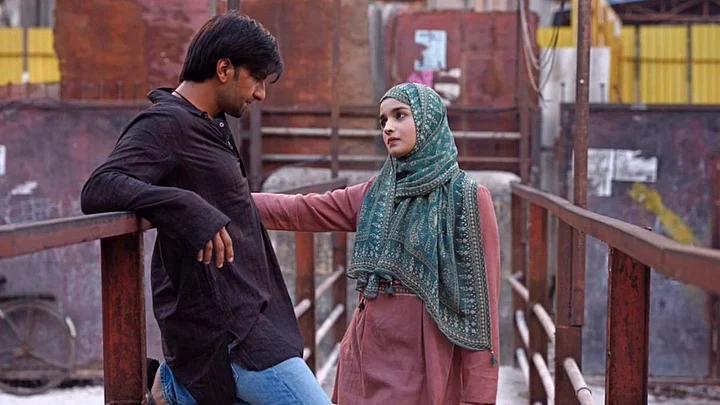At the very outset, what works incredibly well for Gully Boy, is the fact that it doesn’t take an outsider’s view into the realities it wishes to participate in. The streets of Mumbai, the ambitions that aren’t boxed into the homes and circumstantial realities, are all real, infectious and palpable.
How as women we struggle to do everything ‘normal’ around us. And how it is so important to either lie about our freedoms or fight for them, because that is probably the only way to keep them alive. Alia’s Safeena is a fiery, feisty girl, with ambition, control of her sexuality and a relentlessness to pursue her dream. Thankful to Zoya Akhtar for her mainstreaming of a woman wearing a hijab, divested from the caricaturised versions we are forced to watch in mainstream cinema. And the often seen view of ‘the other’ in that landscape.
Gully Boy is about audacity, and dreams. It is about taking an aching heart and creating art and poetry from it. The film is deeply political for those who’d like to recognise it. It looks at class apathy, caste distinctions, secularism with a keen lens.
And how inherently normal these gaping differences are around us, that we’ve become indifferent to. This ability to showcase this on screen, to strip oneself of privilege and recognise the apathy of the ‘haves’ requires immense perception and drive to showcase these disparities as massive problems creating a steadily divided and unequal society. A hostile society, that clamps down every ambition that the ‘haves’ believe is not entitled. And that is where Gully Boy finds its heart. The fact that dreaming does not come with privilege. And neither does voice. And a voice must be heard. In personal and political confrontations.
Voice. The single most important facet of Gully Boy. Voice that we all carry deep inside, that whispers, sometimes whimpers into our din-filled ears, the things we’ve deeply desired, and ignored for a path oft travelled. The voice that sometimes, when we let it, becomes louder than the din, insisting we hear it. A voice that screams deeply from our throats at the injustices we see, feel and go through each day. And a voice that helps us express. Express all of this holding our pain, heart and joy for everyone to see and hear. Gully Boy unabashedly celebrates that voice, nurtures it, helps it become much louder than everything else around it. The fact that we must call out injustices we face and have a strong point of view on politics around us, because we can, and because we feel, is intrinsic to the fabric of Gully Boy.
Mumbai itself is a character. It has a indefinable role in the film. Where its largeness, extent and disparities become a glorious, heightened mirror to Murad’s everyday feeling of distinction. The camera lovingly captures details, dust, and dreams in the landscape, with homes piled one on top of each other.
Murad. Gully Boy. First, the deeply sensitive character etched out for him. Simple, vulnerable, unsure and real. A very welcome break from the deeply toxic male characters we have around us and in the film. The graph is beautiful, as is the ease with which Ranveer Singh restrainedly lives him through the film. His empathy, love is palpable, and Ranveer Singh demonstrates how earnest he is as a performer. What is disappointing though, is that despite doing a film as nuanced as this, actors insist on trying to be ‘apolitical’ instead of using their journeys to help create a more equal world, and start the right conversations.
The three Vijays- Vijay Raz, Vijay Verma, Vijay Maurya, Sheebha Chaddha, and Amruta Subhash are truly gifted actors. They bring alive the pressures, the constant expectations children are piled with, and insisting that their definitions of what is right for them, is what they are destined for, are unimaginably nuanced.
Rap is political. Its an art form that is deeply democratic. That allows for anyone who has a voice and the ability to feel express. It has been slotted in misogyny for far too long, with the Honey Singhs and Badshaahs of the world, that for those who have only been exposed to that school of rap will find this both an eye opener and a very welcome change. Every track is painstakingly written, and detailed, and has a context. When without the song the film cannot be propelled further. The only other film I can think of in the recent past to have used music as well, is Talaash. What is common? The brilliant brilliant Reema Kagti.
The find of the film is Siddhant Chaturvedi as MC Sher. It is difficult to imagine that he isn’t just a rapper. He is at ease, with incredible presence, and a fine performer. The entire film has exceptional language consistency, and each character speaks the language like it is their own. It doesn’t caricaturise, doesn’t mimic. It speaks.
The only wishes I had, was that the film could have not cast Hindi cinema’s A-listers (who are both stupendous in the film), but maybe cast those the film is about. But commercial cinema is still at a stage where it has only begun to tell real stories, and still needs names to draw audiences in. And secondly, Azaadi should have been used in its entirety. Sanghwaad se azaadi is as critical a political point as any other, and omitting it almost feels like an attempt to sanitise a film that otherwise breathes real.
But the last word is for the original Gully boys- Divine and Naezy. To have dreamt. And taken their aching hearts and turning them into art.
Watch it.
(This is an opinion piece and the views expressed above are the author’s own. The Quint neither endorses nor is responsible for the same.)
(At The Quint, we question everything. Play an active role in shaping our journalism by becoming a member today.)
